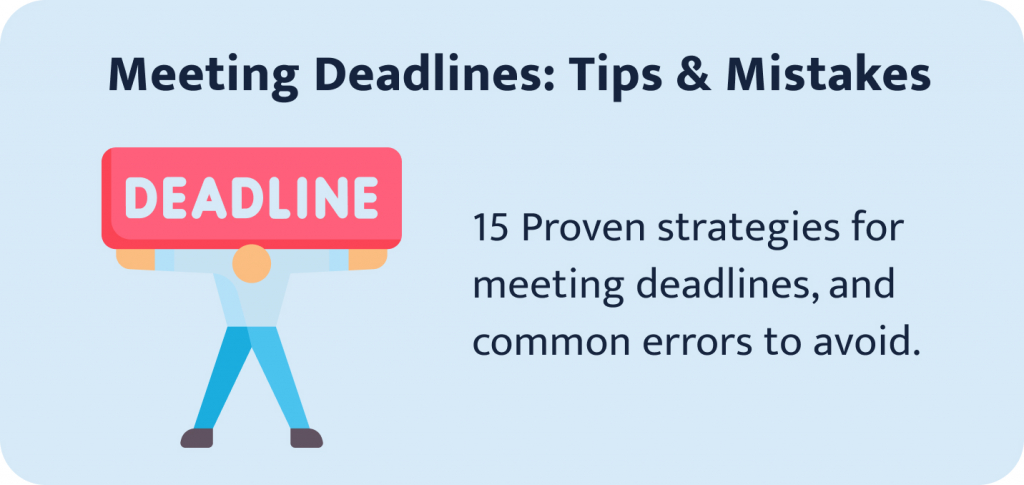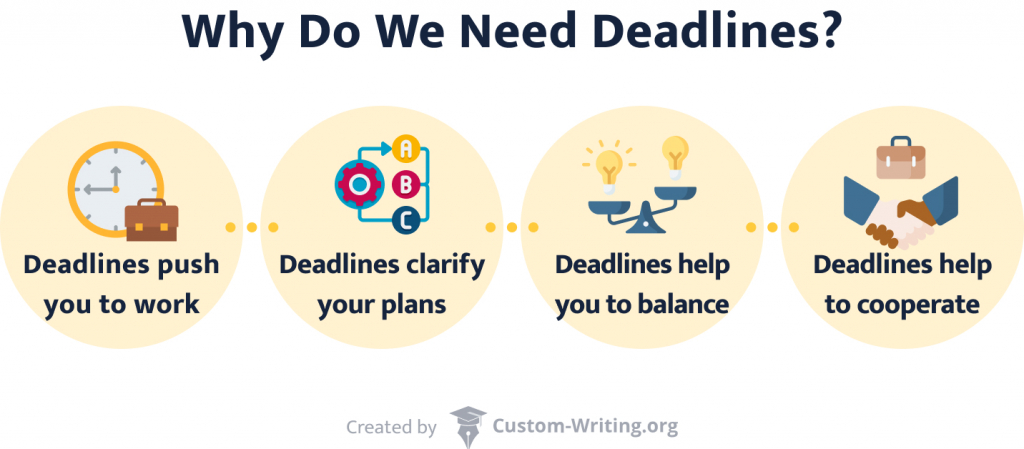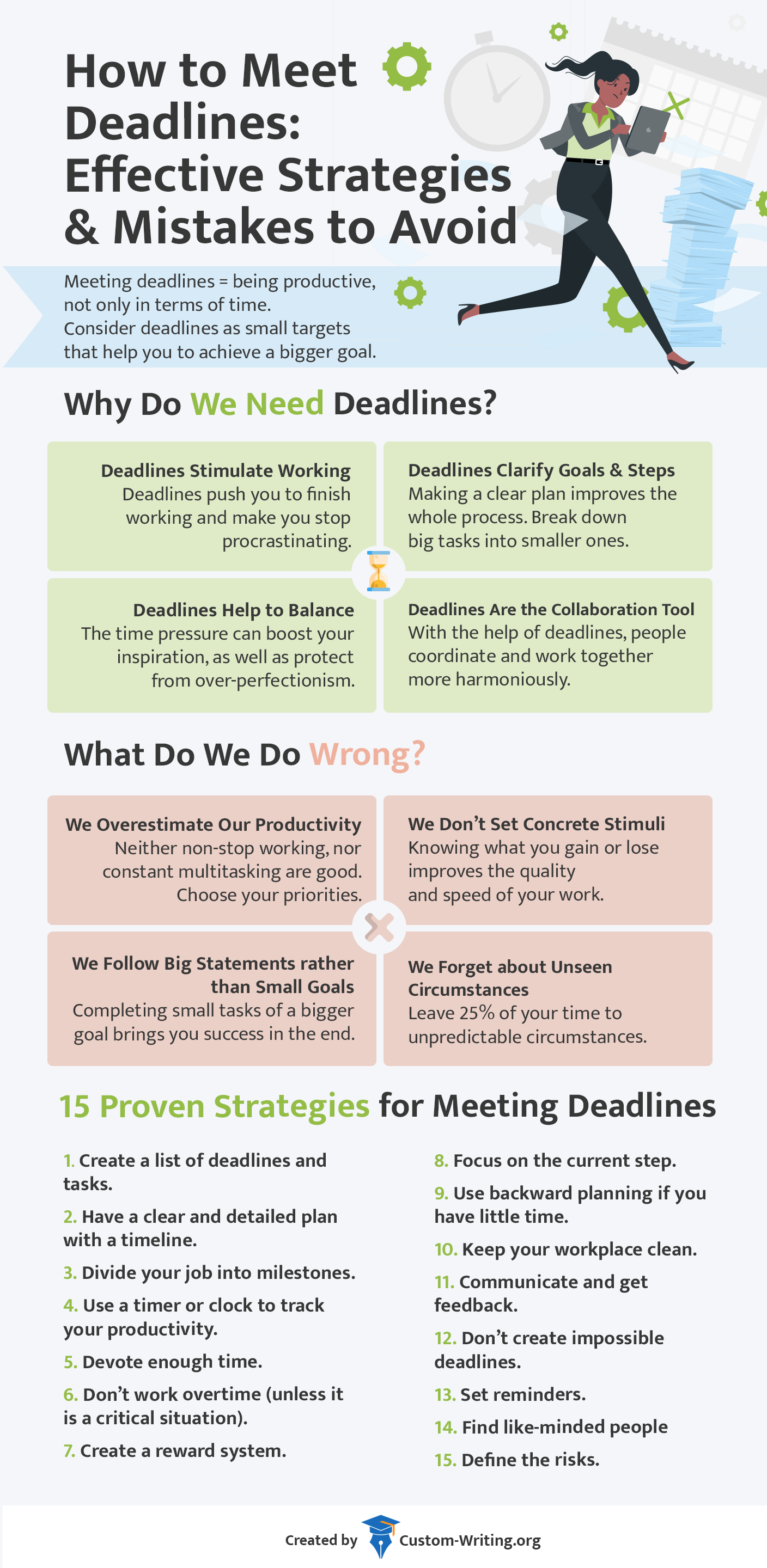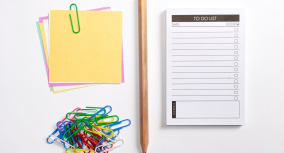There are countless articles online that teach you how to meet deadlines. However, most of them only provide general strategies. In this article, we’ll focus on the root of the problem instead of the minor issues.

We’ve prepared a complete guide to turning your assignments in on time and meeting other deadlines.
There are two crucial things to understand about deadlines:
- Why do we need them?
- WHY DO WE MISS THEM?
Below, you will find helpful information on what to do, what not to do, and how to develop a positive attitude towards deadlines.
Now,
Get back to that burning deadline you have right now! And come back when you’re done.
❓ Why Do We Need Deadlines?
To be honest, deadlines motivate us to do more in a limited time.
Being able to meet deadlines = being productive. Consider deadlines as small targets that help you to achieve a bigger goal.
In this section, we will explain why everyone needs to set deadlines.
Deadlines Stimulate Activity
- Deadlines are stimulators. Even if you leave something until the last moment, a deadline still pushes you to finish your work.
People love to procrastinate, right? And sometimes, it’s hard not to. Imagine if there weren’t any deadlines…
It’s quite likely that we wouldn’t do anything at all without a deadline.
Deadlines Clarify Goals & Steps
- When we have a deadline, we try to plan the appropriate steps and time required for the task. Knowing that you have a little time increases awareness and productivity.
It is better to make an action plan and follow it through until the end. You can create a to-do list, a table, a reminder in a calendar, etc.
It’s vital to create a picture of what you need to do before you begin. You might modify it later, but a clear structure will help you achieve your goals.
Deadlines Help You to Stay Balanced
- Some people become more creative under pressure. A deadline can inspire you to look at your work from a different angle and help you to optimize your time. When you think under pressure, your brain can come up with some unexpected ideas.
At the same time, deadlines protect you from perfectionism. There is nothing wrong with striving to do a good job, but focusing too much on perfection can waste your time. A deadline limits the time you have to work and rest. You can still be productive and attain great results without overcomplicating your tasks.
Deadlines Are a Collaborative Tool
- When it comes to teamwork, a deadline is an essential part of efficiency. It is a tool that coordinates people’s schedules and creates the opportunity for them to brainstorm together.
Knowing you are a part of a team creates a sense of responsibility. It gives you an incentive to work harder, knowing that missing a deadline would spoil the outcome for everyone.

⭕ What Do We Do Wrong?
Okay, now we understand the importance of setting deadlines.
But why, on average, are 6 out of 10 deadlines missed?
Here are the most common mistakes we make when working with deadlines.
We Take on Impractical Projects in the Given Time
You might think that working hard and working a lot are hallmarks of productivity. However, they are not. You must strategically plan your work to take advantage of your time.
Taking on a big project means devoting most of your time to it. Taking on several projects simultaneously means multitasking, which inevitably decreases your productivity. You must choose your priorities.
Plan your time wisely so that you have moments to rest and enough energy to work hard.
We Don’t Create Specific Incentives
You need to ask yourself two questions and answer honestly.
What happens if I miss this deadline? The answers might be range from receiving a bad grade to damaging your reputation or getting expelled.
What happens if I meet the deadline? You might have less stress and more free time. Also, you could receive a good grade or a pay raise.
We Use General Statements Rather Than Small Deadlines
Big goals sound great, but they don’t help you to achieve big things.
We’ll explain with this example:
Let’s say you decided to lose weight. “Lose 15 pounds this year” is a vague goal.
However, what if we said instead, “buy a gym membership; do three workouts a week; lose one pound each week.” Now, that is a clear goal that gives you a small, attainable deadline each week, so you’re more likely to stick to your plan.
We Don’t Consider Unpredictable Problems
This is one of the most common reasons for missing a deadline. Don’t overestimate your productivity, especially if you’re starting a new task. You never know what can happen. Being realistic is better than being too optimistic in this case.
Leave 25% of your time to unexpected circumstances. Don’t worry if you don’t need this extra time. It is always better to finish the task earlier than you expected.
❗ How Can You Meet Your Deadlines?
Now, we’ve gotten to the most exciting part of this article. How can we meet our deadlines?
15 Rules for Meeting Deadlines
- Create a list of deadlines and tasks. Even if you are a naturally responsible person, you can’t keep everything in your head. A simple piece of paper will help you to monitor your progress.
- Have a clear and detailed plan, complete with a timeline. You need to know what to do from the very start. Make sure you estimate the time for each of the steps. Complete your daily and weekly goals step-by-step.
- Divide your job into milestones. Set small deadlines for each part of your work and focus on them, not on the entire project.
- Use a timer or clock to track your productivity. This is the most straightforward instrument. Track your time for each task to know your approximate pace and schedule future tasks.
- Devote enough time to the task. Don’t think that you will be productive during the entire work period. You do need to rest from time to time.
- Don’t work overtime (unless it is a critical situation). You become less productive when you are tired. Give yourself scheduled times to rest.
- Create a reward system. Take a break each time you complete an important task or choose other rewards.
- Focus on the current step. Planning is an essential part of your work, but don’t get caught up in it. Avoid spending more time thinking about doing something rather than actually doing it.
- Use backward planning if you have little time. This means you should set a deadline for each milestone first and then think about how you can meet it.
- Keep your workplace clean. Keeping your area tidy will save you time and keep you organized. A neat space keeps your thoughts arranged too.
- Communicate and get feedback. Perhaps your supervisor or friend can look at your work with fresh eyes. Don’t be afraid to ask them for advice.
- Don’t create impossible deadlines. You might be very motivated and productive at first, but sooner or later, you will begin to feel burned out. Having stamina is more important than going at a fast pace.
- Set reminders. A mobile phone or laptop can become your saviors. Set push notifications or note events in a calendar according to your working plan.
- Create a team. People with similar goals and deadlines tend to work more productively together.
- Define the risks. Think of the difficulties that might arise in the process and make sure you can deal with them.

📢 Meeting Deadlines: Recap
So, here are the main things we learned today:
Good luck and stay productive!
![Getting the Most Out of Career Fairs [The Complete Guide]](https://custom-writing.org/blog/wp-content/uploads/2021/07/company-representatives-reading-applicant-resume-hiring-284x153.jpg)










